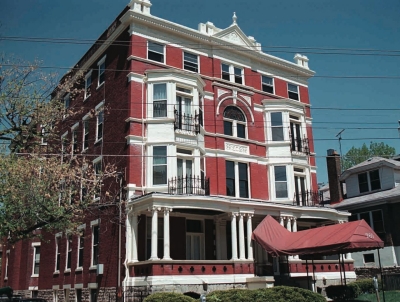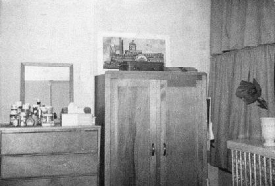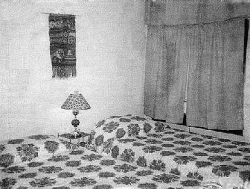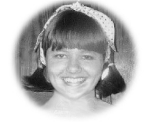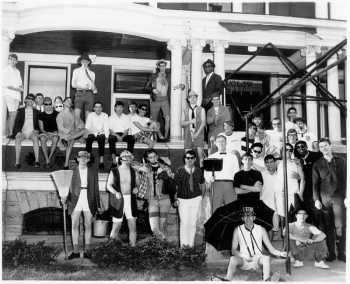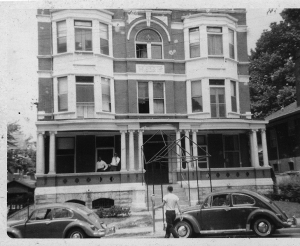| Below: Original letters that instigated the story — in chronological order. |
by Deborah Rieselman
In the summer of 1960, UC purchased the four-story brick Marburg Hotel, originally built in 1902 and located at 260 Ludlow Ave. UC renovated the hotel into a women’s dorm until a new dorm would be completed. When Ludlow Hall opened in that fall, it held only 13 students, two resident counselors and a housemother. By the spring of ’61, though, 78 students lived in its 42 high-ceilinged rooms.
Necessary renovations included installing new electrical wiring, several bathrooms, automatic laundry facilities, a student lounge, a fire-alarm system, a public-address system and a resident-counselor kitchen. Yet to come were sandwich and milk vending machines and a study room in the basement, according to the News Record student newspaper.
But as nice as the rooms were, the women complained about the dorm’s separation from UC by more than a mile and their inability to feel as if they were part of campus, the paper reported. For most of the dorm’s existence, students took a five-minute bus ride to and from campus, using bus passes that were usually provided free of charge.
A women’s dorm for at least the first two years, it also served as a men’s dorm. In the fall of 1966, women had returned, accompanied by a new complaint: buses running “late every day, often not even coming,” making it hard to get to class on time, as they wrote to the News Record in October.
Furthermore, the women claimed that buses ran so late that they frequently missed their prepaid meals on the UC meal plan — a plan that UC mandated they purchase to be sure they ate properly. Their letter to the editor continued, “There aren’t even any machines in Ludlow to keep us alive, especially after 11 p.m. when the doors close. And why, when every other girl on campus has a phone for herself and her roommate, should we have one phone per floor?”
So in the fall of 1967, men took another turn in Ludlow, showing up in greater numbers than expected due to construction delays in opening the new Calhoun Hall for men and the new Daniels Hall for women, both of which opened in October.
Men returned the following fall, but complaints continued — primarily about the total lack of transportation. The bus system had been eliminated after residents neglected to use it the previous year. Hall president Chris Kennedy, Bus ’72, told the News Record that residents spent up to two and a half hours each day walking to and from campus.
Because residents were sometimes unable to reach Logan Hall for dinner, the administration offered to refund their meal “ticket money” or to provide a car to shuttle them back and forth for dinner. Nevertheless, residents had been told they would have to buy their own bus passes on public transportation to get to classes.
By November ’68, the university restored free bus shuttles. Then during the Christmas break, Ludlow Hall was renovated to meet student suggestions, including new phones, new paint in several rooms and new carpeting in some hallways.
Afterward, student attitudes totally reversed direction, and in January 1969, News Record reporter Cliff Radel, A&S ’72, wrote: “Besides boasting good grades, the men of Ludlow believe that they have something almost totally lacking in any of the other dorms — that is a knowledge of other members of their floors and the dorm. Instead of ‘blank faces’ coming out of ‘blank, stereotyped’ rooms, Kennedy feels ‘the guys know each other and the whole hall is a close-knit group.’”
On May 7, 1974, the University Board of Directors approved the sale of Ludlow Hall as it was no longer needed, and the domitory apparently closed at the end of the academic year.
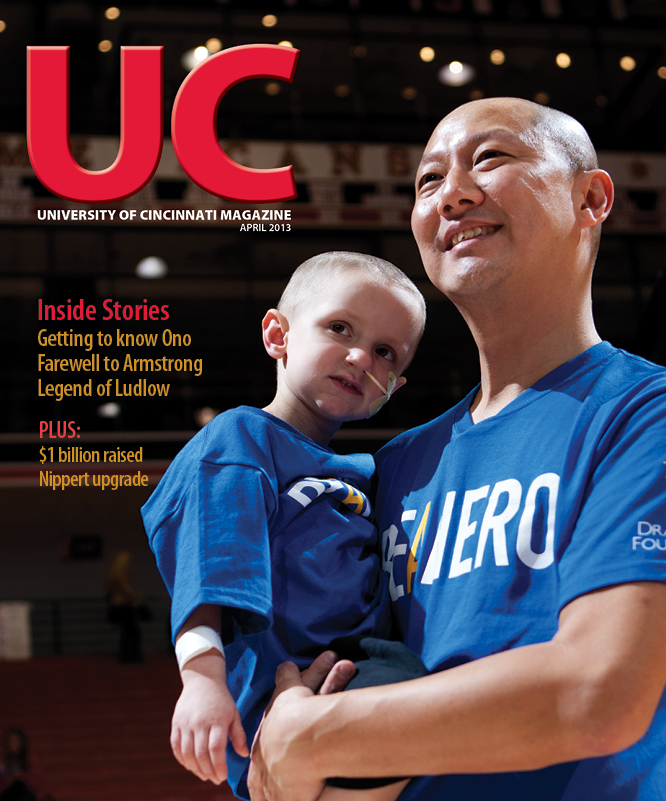
 Past Issues
Past Issues